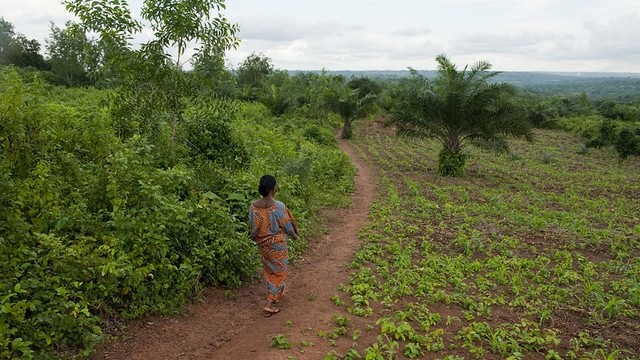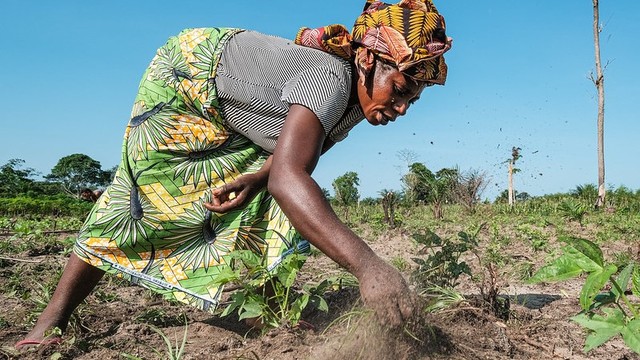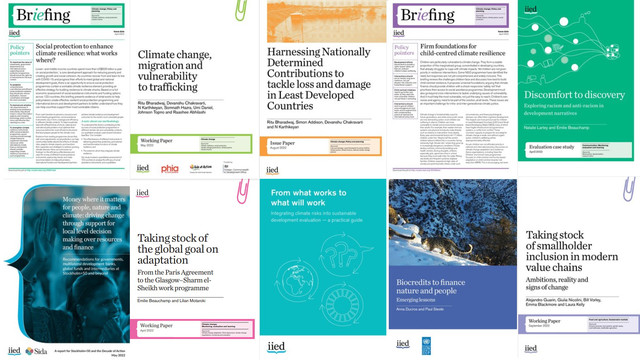Best of 2017: videos
Video can be a powerful tool for communicating sustainable development issues. We uploaded 132 videos to our YouTube channel during 2017. Here we look at some of the videos we published and how video helped us deliver research and information in different ways.
Showing the people who are creating change: artisanal mining
Artisanal and small-scale mining (ASM) is known for poor practices – but that is not the only story. We recorded a series of videos that told 'stories of change': how ASM communities are adopting positive approaches to common problems.
Watch the introductory film below and read the related blog on how communication is helping mining communities learn about good practices being developed by their peers.
You can watch all the videos in this series in this playlist.
Informing decision makers: managing large dam projects
Videos can be an excellent tool for informing policymakers about complex issues. The Global Water Initiative – West Africa works with farmers and governments to shape policies related to large dams. GWI produced three animations highlighting measures that could improve implementation. This video explained how local development funds can provide long-term financing to communities who lose their livelihoods forced off their land by dam construction.
IIED's Jamie Skinner explained: "We've created this short animation to inform decision makers and other stakeholders about the potential of local development funds as a simple way of making sure resettled communities directly receive their share in the dam's benefit."
These animations are available in English and French with English/French subtitles.
Events: sharing projects on community-based adaptation
Videos can kickstart discussion at conferences and workshops. The 11th International Conference on Community-Based Adaptation (CBA11) was held in Uganda in June. The film session allowed participants to show films about their work and discuss their experience with colleagues. This film by the International Union for Conservation of Nature (IUCN) looks at radio and mobile phones as a tool for adaptation.
You can watch a playlist of all the CBA11 film submissions on YouTube.
Reporting on events: a personal insight into COP
For major international events, videos can provide an opportunity to interpret progress and provide a personal insight into proceedings. IIED published daily video round-ups from the 23rd Conference of Parties (COP23) to the UN Framework Convention on Climate Change in Bonn.
One delegate provided a very personal view of her experiences during the COP23 'gender day'. Sheela Patel, director of the Society for the Promotion of Area Resource Centers (SPARC), angrily described how the panel she had been invited to join – on how to get climate finance to local communities – was cut short before she could speak.
You can watch a playlist of all our reports from the 2017 climate talks.
Recording different voices: food and agriculture in Zambia
Videos can highlight varied points of view. The 'Life beyond maize' film shows interviews with Zambian Minister of Agriculture Dora Siliya, a small-scale farmer, and a working family. Each interviewee shares their perspective on the urgent need for diversification in Zambia's agricultural production and consumption habits.
This video was part of a joint IIED/Hivos project on sustainable diets for all.
Everyday realities: cotton contracts in Zambia
In December IIED and the Indaba Agricultural Policy Research Institute (IAPRI) published a video about Zambia's cotton industry, focusing on the issue of 'side-trading' – the practice of farmers breaking their contracts with their investors and selling to other buyers. A related photo story explained why this is a major concern and highlighted the challenges facing farmers and investors involved in contract farming arrangements, especially as markets become more competitive.
Stone Village: a beautiful portrait of biocultural heritage in action
IIED co-produced a 12-minute film profiling China's Stone Village, which is home to 220 Naxi ethnic families and is a living example of the value of conserving biocultural heritage. The beautifully filmed video explores how farmers work together to sustain efficient water management systems, save seed varieties and respond to changes in climate and markets.
This film, which has both English and Chinese subtitles, is part of IIED's work on biocultural heritage. It was produced by Dr Yiching Song, of the Centre for Chinese Agricultural Policy, in collaboration with IIED, the Farmers' Seed Network in China and Jumping Cat Studio.
Interview: explaining better evidence
Video interviews can help experts explain their work and why particular aspects of it matter. In this interview, IIED's Stefano D'Errico talked about the importance of generating better evidence to help decision makers. He described IIED's work to identify the key characteristics of better evidence and a series of publications looking at methodological approaches that can generate better evidence.
Capturing the mood: junior climate negotiators workshop
Videos can capture the mood of an event quickly and effectively. This charming short film portrayed junior climate negotiators practicing their skills in mock climate negotiations. It was recorded at a workshop in Senegal organised by the European Capacity Building Initiative (ecbi).
IIED and Oxford Climate Policy manage ecbi's training and support programme, which aims to build capacity among UNFCCC negotiators from vulnerable developing countries. The video was filmed by IIED and Enda Energie.
Communicating messages: partnerships
Video can deliver institutional information in a lively way. To mark the publication of IIED's 2015/16 Annual Report, we produced a four-minute animation illustrating how we work with partners around the globe to deliver change at the local, national and international level.
The video summarises the annual report and shows examples of IIED working with partners on issues such as food security, securing land rights and sustainable urban development. IIED is engaged in 371 partnerships in more than 60 countries with over 300 organisations.
A wide and varied resource
These videos are only a selection of the films we hosted during 2017. Watch all of these videos – and many more – on IIED's YouTube channel.



